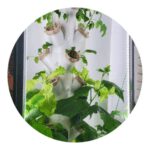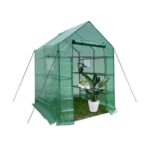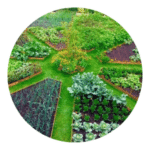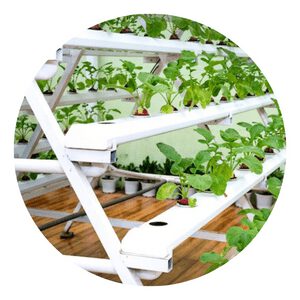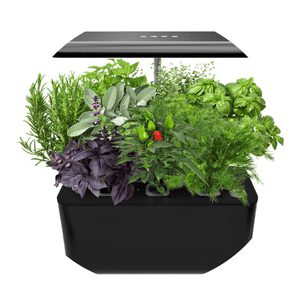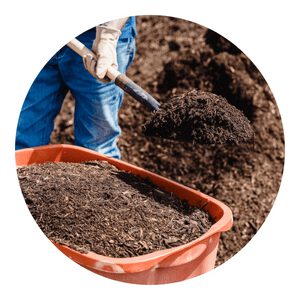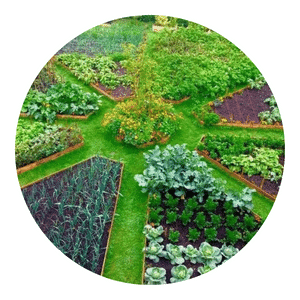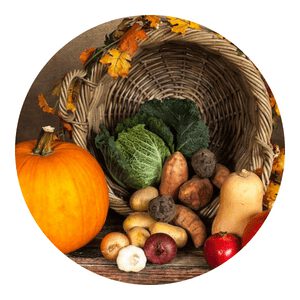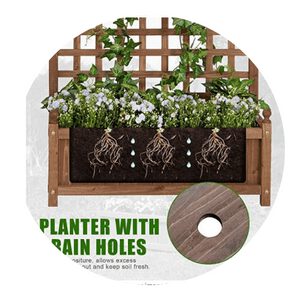What Is Aquaponics And How Does It Work?
Aquaponics is a method of growing plants in a water-based environment without the use of soil.
The word aquaponics is a combination of the words “aquaculture” and “hydroponics.”
Aquaculture is the raising of fish, crustaceans, or other aquatic animals in tanks or ponds.
Hydroponics is the growing of plants in a water-based solution without soil.
Table of Contents1
Aquaponics defined
Aquaponics is a type of agriculture that combines raising fish with growing plants.
The fish waste provides nutrients for the plants, and the plants help to clean the water for the fish.
Aquaponics is a sustainable way to produce food, as it uses far less water than traditional agriculture and doesn’t require any chemical fertilizers or pesticides.
Aquaponics systems can be as simple as a fish tank and a pot of plants, or they can be large and complex.
Commercial aquaponics operations are popping up around the world, providing fresh, local produce and fish year-round.
If you’re interested in starting your own aquaponics system, there are many resources available online to get you started.
You can also find kits that include everything you need to set up your own aquaponics garden at home.
How Aquaponics Works: Nitrification cycle
Aquaponics is a form of agriculture that combines raising aquatic animals with hydroponics, or growing plants in water.
The waste produced by the animals provides nutrients for the plants, and the plants help to filter the water for the animals.
This symbiotic relationship between animals and plants creates a closed-loop system that is sustainable and efficient.
The key to aquaponics is the nitrification cycle, which is a process by which bacteria convert ammonia into nitrites and then nitrates.
Ammonia is produced by the breakdown of organic matter, and it is toxic to both plants and animals. However, bacteria can convert ammonia into nitrites, which are not as harmful. Nitrites are then converted into nitrates, which are used by plants as fertilizer.
The nitrification cycle allows aquaponics systems to recycle nutrients and avoid pollution.
The Benefits of Aquaponics
Aquaponics is a food production system that combines conventional aquaculture, or raising aquatic animals, with hydroponics, or growing plants in water.
Aquaponics is not only efficient but also sustainable, as it recycles water and nutrients between the two systems. The fish waste provides an organic food source for the plants, and the plants help to filter the water for the fish.
There are many benefits to aquaponics, including that it can be done on a small scale in your backyard or on a larger scale to produce commercial crops.
Aquaponics is also very efficient, using 10% of the water that traditional farming uses. This makes it an excellent choice for arid climates or areas with limited water resources.
In addition, aquaponics does not require chemical fertilizers or pesticides, making it more environmentally friendly than traditional farming methods.
The Different Types of Aquaponics Systems
Aquaponics is a type of agriculture that combines raising aquatic animals with hydroponics, or growing plants in water.
The waste produced by the aquatic animals provides nutrients for the plants, and the plants help to filter the water for the animals.
Aquaponics systems can be used to grow a wide variety of crops, including fruits, vegetables, grains, and herbs.
There are three main types of aquaponics systems: media-based, deep water culture, and floating raft.
Media-based systems use gravel, sand, or clay as a growing medium for the plants.
Deep water culture systems suspend the roots of the plants in a tank of nutrient-rich water.
Floating raft systems have the plants growing on top of a foam raft that floats on top of the water.
What is aquaponics and how does it work? Aquaponics combines the best of two domains: hydroponics and aquaculture. Both the fish and plants get plenty of nutrients and oxygen without having to travel far, which saves time and energy.
Chappy The Gardener
Setting up Your Own Aquaponics System
Aquaponics is a system of growing plants and raising fish together in one integrated system.
The fish waste provides nutrients for the plants, and the plants help to filter the water for the fish. Aquaponics is a sustainable way to produce fresh, organic vegetables and fish year-round.
If you’re interested in setting up your own aquaponics system, there are a few things you need to know. First, you’ll need to choose a location for your system.
It should be in a sunny spot with access to water and electricity. You’ll also need to choose the type of system you want to build.
There are many different designs available, so do some research to find one that will work best for your needs.
Once you have your location and design chosen, you can start building your system.
How does aquaponics fish work?
Aquaponics fish work by providing nutrients to the plants in the system. The fish waste contains ammonia, which is converted into nitrites by bacteria in the system.
The nitrites are then converted into nitrates, which are used by the plants as nutrients. The plants help to purify the water for the fish, and the cycle continues.
Aquaponics is a great way to produce fresh, healthy food while using fewer resources than traditional methods.
It is a sustainable system that can be used to grow a variety of plants and vegetables.
Are aquaponic vegetables healthy?
Aquaponics is a type of agriculture where plants and animals are grown together in a symbiotic environment. The waste produced by the animals provides nutrients for the plants, and the plants help to filter the water for the animals.
This type of agriculture has many benefits, including being more efficient with water usage and land usage, and producing healthier food.
But what about the health of the food itself? Are aquaponic vegetables healthy?
The answer is yes! Aquaponic vegetables are just as healthy as those grown in traditional soil-based gardens.
In fact, they may even be healthier due to the lack of pesticides and herbicides that can contaminate soil-grown crops.
And because aquaponics uses less water than traditional gardening, there is less chance for harmful bacteria to contaminate the plants.
Do aquaponics systems smell?
There are many different types of aquaponics systems, and each one is slightly different.
However, most aquaponics systems do not produce a noticeable smell. The plants and bacteria in the system help to filter out any waste products and keep the water clean.
If you are concerned about smells, there are a few things you can do to reduce any potential odors.
First, make sure your fish tank is covered. This will help to prevent any smells from escaping.
Second, consider adding a small amount of vinegar to your system.
This will help to neutralize any bad smells. Finally, be sure to clean your system regularly. This will help to remove any build-up of waste products that could cause odors.
Overall, aquaponics systems are very low-maintenance and do not produce strong odors.
Which fish is best for aquaponics?
Aquaponics is a method of growing plants in water that is constantly recirculated and filtered.
The water contains nutrients that the plants need to grow, and the plants help to purify the water for the fish.
There are many different types of fish that can be used in aquaponics, but some are better than others.
Here are a few of the best fish for aquaponics:
1. Tilapia is a popular choice for aquaponics because it grows quickly and is relatively easy to care for. It also has a high tolerance for poor water quality, which makes it ideal for beginners.
2. Catfish are another good option for aquaponics because they are hardy and can tolerate a wide range of water conditions.
3. Barramundi is a tasty fish that can be grown quickly in an aquaponics system.
4. Bass are a good option for aquaponic systems because they can grow to large sizes and are very adaptable.
Does aquaponics need fertilizer?
Aquaponics is a method of growing plants in water that is highly oxygenated and nutrient rich. The water comes from an aquaculture system, and the nutrients come from the waste produced by the fish in the system.
Aquaponics does not require any chemical fertilizers, as the fish waste provides all of the nutrients that the plants need to grow.
While aquaponics does not require fertilizer, there are some benefits to using a natural fertilizer such as manure or compost.
Manure and compost can add additional nutrients to the system that can help the plants grow more vigorously.
Additionally, using a natural fertilizer will help to keep the water clean and free of any harmful chemicals.
What are the challenges of aquaponics?
There are a few challenges to aquaponics that include set up costs, maintenance, and fish selection.
Set up costs can be expensive because you need to set up two systems (a hydroponic system and an aquaculture system) and connect them.
You also need to have a constant supply of water that is the right temperature for the fish.
Maintenance can be tricky because you have to monitor both the plants and the fish to make sure they are healthy.
The plants need the right amount of nutrients, and the fish need the right amount of food and oxygen. If one system gets out of balance, it can affect the other system.
Fish selection is important because different fish have different needs. Some fish are better suited for aquaponics than others.
How do I keep my aquaponic tank clean?
Aquaponics is a fantastic way to garden, but it does require some maintenance to keep your system running smoothly.
Here are a few tips on how to keep your aquaponic tank clean:
1. First and foremost, you need to make sure that your fish are healthy and happy. This means regular water quality testing and keeping an eye out for any signs of illness.
A healthy fish population will produce less waste, which in turn will mean less work for you in terms of cleaning the tank.
2. Keep up with your regular water changes. This will help to remove any build-up of toxins in the water that can be harmful to your fish.
3. Pay attention to the plants in your system. If they are starting to look yellow or unhealthy, it could be a sign that the water quality is poor and needs to be addressed.
How many fish can grow in aquaponics?
Aquaponics is a method of growing plants in water that is enriched with the nutrients produced by fish.
The fish waste provides an organic food source for the plants, and the plants help to filter the water for the fish.
Aquaponics systems can be used to grow a variety of plants, including vegetables, fruits, and herbs.
Fish are often the main focus of aquaponic systems, as they are a key part of the nutrient cycle.
But how many fish can you realistically grow in an aquaponic system?
That depends on a number of factors, including the type of system you have, the size of your fish tanks, and the types of fish you are growing.
In general, it is recommended that you start with one pound of fish per square foot of grow space.
How is aquaponics better than farming?
Aquaponics is a method of farming that is more efficient and effective than traditional farming methods.
Aquaponics uses fish waste to fertilize plants, which in turn filters the water for the fish. This closed-loop system recycles water and nutrients, making it a more sustainable way to farm.
Aquaponics also uses less land than traditional farming, and can be done indoors, making it a more versatile option for farmers.
Overall, aquaponics is a better option than traditional farming methods, and is a more sustainable way to produce food.
Can you do aquaponics without fish?
Aquaponics is a method of gardening that combines raising fish with growing plants.
The fish waste provides nutrients for the plants, and the plants help to purify the water for the fish. Many people wonder if it’s possible to do aquaponics without fish.
While it is possible to do aquaponics without fish, it’s not really recommended. The whole system relies on the symbiotic relationship between the fish and the plants.
Without the fish, there would be no nutrients for the plants, and without the plants, the water would quickly become polluted and unsuitable for any life.
If you’re interested in trying aquaponics but don’t want to deal with live animals, you could always start with a small test setup using just plants.
Once you see how everything works and get a feel for it, you can always add fish later on.
In conclusion, aquaponics is a sustainable system that combines aquaculture and hydroponics to create a self-sufficient food production system.
It works by feeding fish and plants together in an enclosed environment, which creates a healthy ecosystem that can produce food efficiently.
Aquaponics is perfect for small farms or individual households that want to sustainable produce their own food.
Click To Grow
Helps Us Grow – Share If You Like

